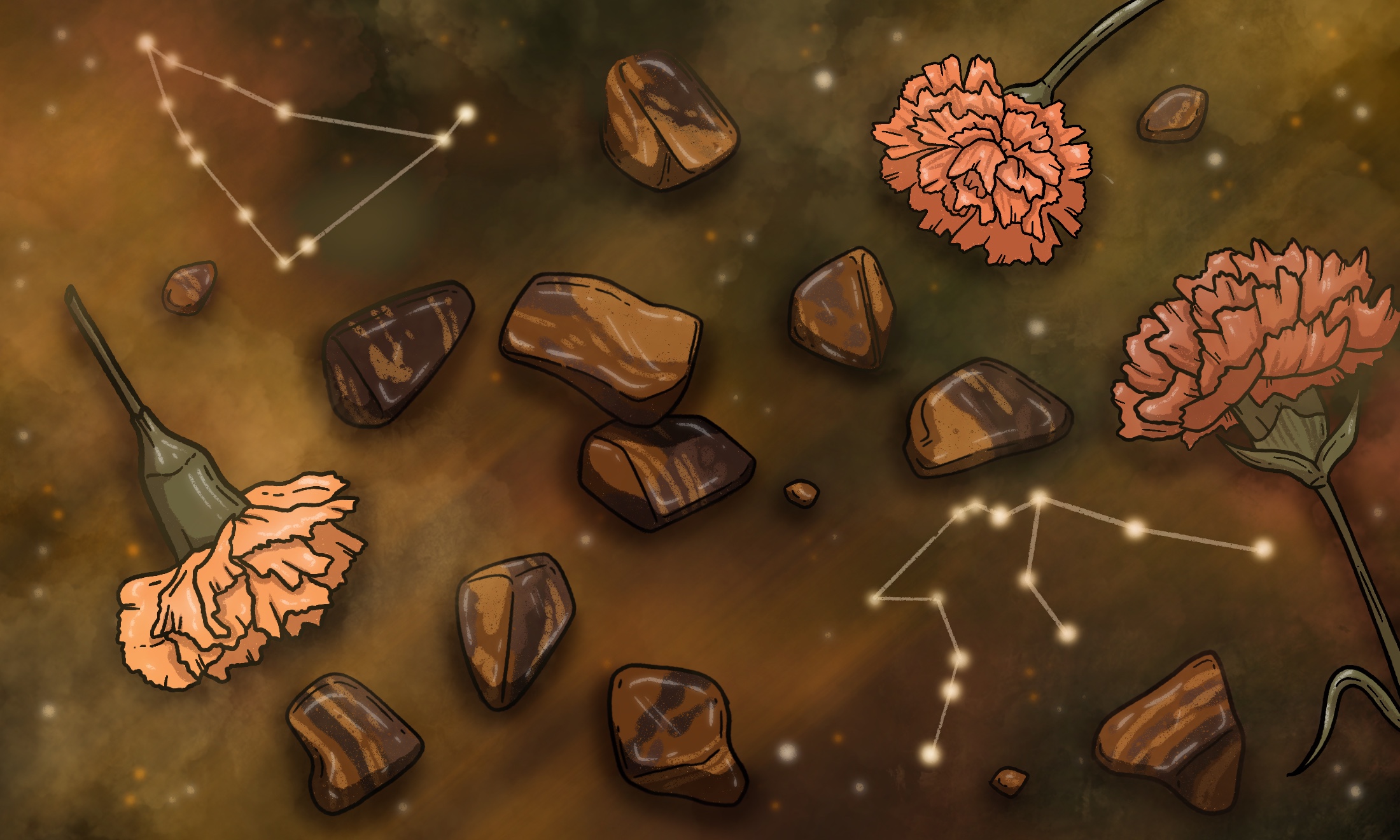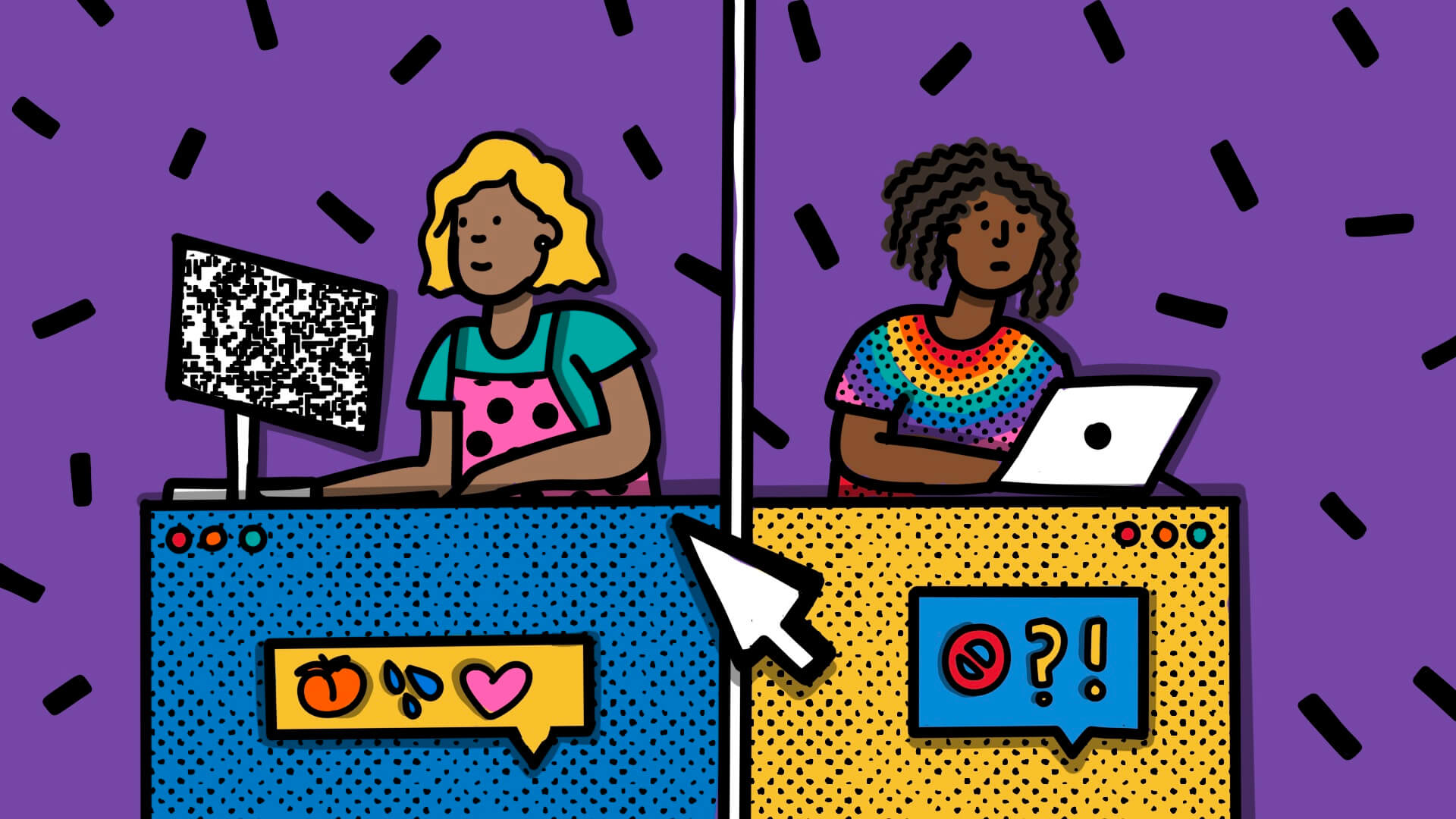
Queeries: is it wrong to think about killing myself?
Fagony Aunt Aisha Mirza explains what suicidal ideation is, why these thoughts aren't wrong or selfish and what to do to best get the support you need.
Aisha Mirza
09 Oct 2020
Illustration by Soofiya
CW: What’s to follow is a very frank conversation about suicide and thinking about killing yourself (neither of which are wrong) as well as a contextualised exploration of these thoughts, ideas for talking to others about them, and how you can get help and survive beyond an emergency phone number. People’s approaches around suicide vary. These are my beliefs based on my own experiences with suicidal ideation, global radical mental health practices and years working as a crisis counsellor and volunteer at Crisis Text Line. If you don’t feel you’re in the headspace to read this right now, you can skip right to the end for resources.
“I have had thoughts about suicide on and off since I was a teenager but they have come back a lot stronger in the last few weeks. I do not usually talk about these feelings as, to be honest, I’m kinda embarrassed to have them. I’m starting to think they’ll never go away and I’m not sure what to do, how to make them stop or when I should talk to someone about it.”
Congratulate yourself for giving voice to these thoughts for the first time and generating conversations such as these – that’s huge. Thoughts about ending your own life (suicidal ideation) are so commonly experienced and yet so rarely spoken about beyond the alarmist image of a forlorn white man standing on a bridge in his work clothes. Suicidality is nuanced and vast in its expression and there are so many ways to approach it beyond panic and fear. Let’s normalise talking about it all.
Thinking about killing yourself is – and I can’t stress this enough – in no way wrong. It is no more wrong than thinking about what colour you’re going to dye your hair next, whether the couples from that season of 90 Day Fiancé are still together or why you’ve never seen a baby pigeon. Thinking about killing yourself is often intense, complicated and painful, yes, but wrong? Never, no.
“Suicide is a social issue, one that the LGBTQI+ community knows too well”
Unfortunately, there’s successful societal propaganda that labels suicide as a selfish or thoughtless act that is carried out exclusively by people who do not think about anyone else. This is untrue. If anything, depressives and suicidal people could probably do with thinking a little less about absolutely everything. This lie belongs to a collection of myths around suicide such as: “talking about it increases the risk of people doing it” and “only ‘mentally ill’ people think about killing themselves”.
These narratives are suitable for our crooked society because they distract from the fact that this world is so intolerable to so many. The bodies and souls of queer and transgender Black and brown people are policed and punished on earth in unimaginably cruel ways. It is beneficial for the status quo to understand people who take their own lives as selfish, and suicide as an individual issue, rather than interrogate the breathtaking selfishness that characterises the global systems that make this world unlivable. Suicide is a social issue, one that the LGBTQI+ community knows too well.
When we catch ourselves judging our inner thoughts in this way it can be useful to ask, by whose standards might these thoughts be “wrong”? A ruling class that wants me to stay alive so I can continue to work and produce capital for their benefit? Big Daddy in the breeze who claims more power over my body and destiny than myself? A deep, familial guilt that despite my ancestors’ best efforts at survival I’m just not feeling that attached to the idea of being alive right now?
I get it. I personally have depression-napped through more of my life than all of the women in the history of my family have had the chance to, and that is an awkward truth and yes I do feel guilty about it. But I try to remember it’s never wrong to cope, heal and investigate yourself in ways that feel natural to you. Thinking about killing yourself can already be a very difficult experience. Try to allow yourself the gift of releasing any guilt, judgement or moralism you may feel about what you’re going through. There’s a good chance a lot of it wasn’t yours in the first place. And in so doing, we can create our own reasons for staying alive.
What is suicidal ideation?
Suicidal ideation can be roughly divided into two categories; passive and active, to help us understand the intricacies of it, not because we love binaries.
Passive ideation is characterised by abstract thoughts of ending your own life, death and wishing for things to end. Sometimes the fear for those with passive ideation isn’t that they might actually kill themselves, but rather that the thoughts will last so long that they will become normal. These thoughts can occur once, multiple times, or almost constantly, like a hum in the background of everyday life.
Active ideation is more chronic and imminent – the person experiencing it may have a plan to kill themselves, which can vary in terms of feasibility. If there is no plan for suicide, the feeling is so overwhelming that it cannot be shaken and interferes constantly with that person’s ability to live life.
In this way, suicidality is a spectrum, that some people move up and down. Wherever someone is on this spectrum, they deserve to be heard, taken seriously, soothed and to know they’re not alone in feeling this way.
Living with suicidal ideation
For those who live with suicidal ideation of any kind, it’s really useful to learn how it shows up for you, how you can manage it, and how you will know when you’re in danger. Are your thoughts about death coming up because you actually wish to end your life, or do they stem more from a desire for something to change or stop? Can you tell the difference? What are your triggers? What does your support network look like and how will you communicate with them? What crisis services are available in your area? How often would you like people to check in with you about your suicidal thoughts? What do your suicidal thoughts show you about how you’re feeling and what you need? How can you learn to observe them, without them consuming you?
Speaking to other people
People are scared to disclose that they have been thinking about killing themselves because once they do, too often their agency is stripped from them, particularly if they’re Black or brown. This can look like being threatened with involuntary incarceration or other violences because they are deemed no longer capable of making thoughtful or rational decisions. This is very shitty and wrong and assumes that a) suicidal ideation is experienced in a similar way by everyone, b) someone else knows what that person needs better than they do and c) people should be coerced and punished out of their suicidality and trauma rather than supported in healing. This solidifies the stigma and fear of speaking openly about these thoughts which in turn increases isolation and the likelihood of a suicide being completed. Some of the systems in place are, very slowly, moving in the right direction, but the societal apparatus for suicide prevention (e.g. housing, dignity and safety for all) is still lacking (to put it kindly) so it’s really important to find people you can share with safely.
Find and chat openly with people who experience suicidal ideation or know how to hold conversations about it in a non-judgemental, knowledgeable, calm and funny (when that’s appropriate) way. This can be key to living with it, and protecting yourself from harm. Learn, if you can, the intricacies of each other’s suicidal ideation. For example, sometimes I feel like the only thing keeping me from killing myself is the pressure of writing a suicide note, so if I did write one, that would be an indication to me that I was feeling more serious than usual about following through. But I have a friend who writes suicide notes often when they’re feeling low, and sometimes they call me and with my permission read them to me, and we chat for a bit about life and some of the reasons why they aren’t going to kill themselves and I tell them that if they do, I’m going to have to kill myself too and then they will burn in the eternal flame for a murder of sorts, and we laugh a bit and tomorrow’s a new day.
You share that you’re not sure if your suicidal ideation will ever go away, and I don’t have the answer to that. I hold you, though, in your fear that it may not. Perhaps it will, or perhaps you will learn a system of managing it that feels ok. Perhaps like me, through many years of therapy and medication the suicidal ideation will settle nicely into waiting patiently for the demise of the human species as a whole instead.
If you don’t have one already, please get a therapist and be sure to ask them what their approach to suicidal ideation is to suss out if they understand it as a normal part of human experience, or if they have a more reactionary and carceral approach. If it gets to the point where you think you may be in imminent danger, find someone you trust to accompany you to Accident & Emergency, and ask to be referred to a Home Treatment Team when you get there. It’s not perfect, but it is an immediate level of support that can be helpful. You can also reach out to The Maytree, a non-medical respite for people experiencing suicidal thoughts (more of this, pls god).
Surviving suicidal ideation
There is so much power to be gained in uplifting and being vulnerable with each other. Become closely acquainted with your life rafts – the things and people you want to live for. Write a list, if you’re that way inclined, and keep it somewhere that’s easy to access, alongside instructions for how you wish to be supported if you are actively suicidal. Plan things for the future, holidays or quiet walks in the rain. Have three-hour-long baths and nap as much as possible and without guilt (suicidal ideation is exhausting).
Listen to your favourite music loud, eat as much as you can, stare at the wall. Let yourself be slow. Honour your pain. Accept that some days your head will be full to the brim with despair and catastrophe and that it’s ok and it will pass and everything is temporary. Create and maintain boundaries to remove people and places that do not feel good from your life. Nurture your friendships.
Be kind to yourself always, or as much as possible, and know that you can be a thriving, whole and precious person and have suicidal thoughts too. Honour yourself as a sensitive and compassionate being who has dared to really look and really see and really feel, because let’s be honest, if more people did that they would want to kill themselves too. It is not a sign of sickness to feel unwell in this world. Thinking about death and the different ways we can have autonomy over death is also thinking about life, the quality and value of living, and of striving for something better.
For everyone who has killed themselves, everyone who has tried and everyone who stays.
Suicidal ideation resources:
Maytree: Respite center & signposting service for suicidal people (based in North London)
The Listening Space: Free listening support (IRL & phone) for suicidal people
Crisis Text Line UK / Shout: 24/7 crisis text line for those experiencing crisis including suicidality (can also train as a volunteer counsellor!)
TrevorLifeline, TrevorChat, and TrevorText: (LGBTQ+ crisis support)
International suicide hotlines: A comprehensive resource list for people outside the US
Suicide Q&A: highlight on my IG
Misery: London-based mental health collective for QTIBPOC
The Fireweed Collective: US-based radical mental health collective
Open Dialogue UK: Info on alternative crisis care being brought to UK from Finland
Black & Asian Therapist Network: Therapist Directory
Mindfulness-based Cognitive Therapy: Online course
Suicide is Political Webinar by Project LETS
Pod Mapping Worksheet by Mia Mingus








